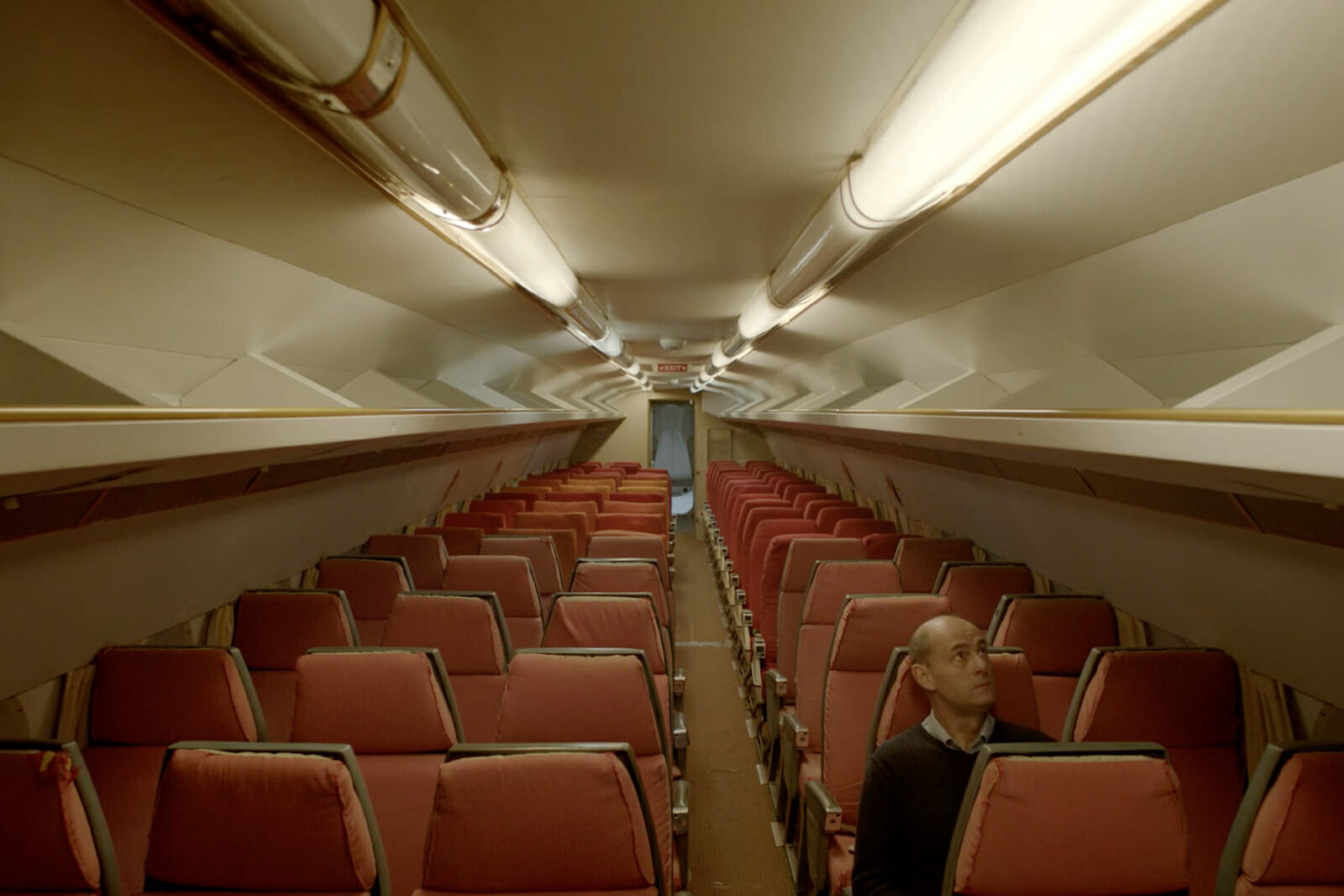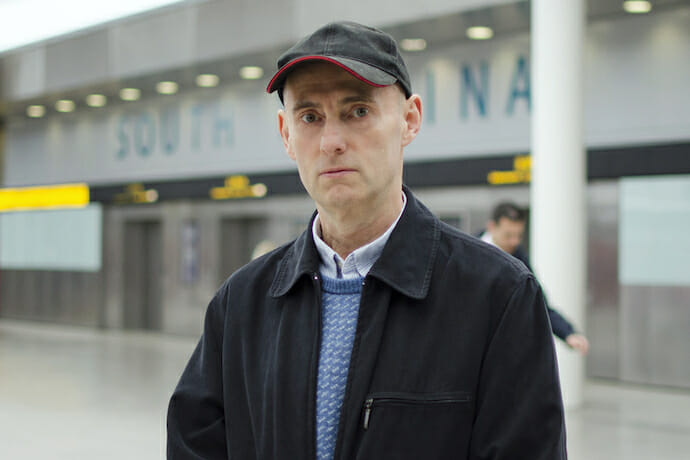
Interview with Former Airline Pilot Tristan Loraine, Director of ‘Everybody Flies’
“When you’re a passenger on an airplane, where does the air you breath come from?” That is the central question of Tristan Loraine’s new documentary, Everybody Flies.
Being a former airline pilot himself and having become sick and having to retire due to air quality on airplanes, it’s a question he wanted answered. It’s the central premise behind his film.
Our conversation, conducted via email and edited only for content, is below.
Could you discuss your background and what led you to make Everybody Flies?
I used to be a British Airways airline Captain and union H&S rep. In 2006, I was ill-health retired after repeated exposures to contaminated air in the aircraft I flew. I retrained at the National Film and Television School (NFTS) and with Raindance in London and then set up my production banner ‘Fact Not Fiction Films’ to make films on the issue. In 2015 we released the feature film A Dark Reflection and a film critic said to me, great film but without any A-list cast it will never have the reach the issues you are raising deserve. They suggested I make a new documentary on the problem. That project has become Everybody Flies which premiered in 2019 at the Raindance Film Festival, American 965 which was finished on 1 Jan 2021, and Aerotoxic a short form doc that will be finished later this year.
If I’m not mistaken, the crux of the problem is that airlines still rely on bleed air systems. Can you discuss some of the inherent problems of this system?
Bleed air is the process of taking compressed air from the compression section of an engine. When the industry first started to do this in the 1950s, it soon discovered oil would and could leak past the seals in the engine bearing chambers and this heated oil could contaminate the bleed air. The bleed air is also the breathing air and this bleed air is not filtered so people get exposed. This is a system that will leak oil in small amounts on all flights to higher levels with poor maintenance, wear, or failure. Ironically, in a safety-critical industry, it is a system that fails dangerously. The warnings on the oil and hydraulic cans which contaminate the breathing air provided to crews and passengers clearly state: “Suspected of causing cancer,” “do not breathe mist or vapour from heated product,” “suspected of damaging fertility” etc… Why are passengers not told this?

In Everybody Flies, you touch on that one type of Boeing jet that does not use a bleed air system. Why did they move away from this system?
The Boeing 787 no longer uses bleed air from either the engines or the APU in the tail of the aircraft. The APU is the small engine used on the ground for electrical power and air conditioning etc… Instead it uses electrical compressors. This makes the engines more fuel economic so that would have been a major factor. When they were designing the Boeing 787, Boeing knew about the contaminated air issue, as they had known about it since the 1950s. Maybe they thought let’s try and fix the problem. Who really knows all the reasons behind their decision but it was a great initiative and they should be praised for doing it on the Boeing 787. It’s a shame Airbus did not do the same on their new aircraft. If you have a choice – always choose to fly on a Boeing 787 if you can. That way you know you will always get clean air to breathe in flight.
How common is it for passengers and flight crews to fall ill from foul air on airplanes?
Nobody knows as airlines never tell passengers about this and even when larger contaminated events occur like we show in the film, neither the airlines nor any public health authority check up a week, month, or 10 years later to see what happened to the people exposed. What would be an interesting survey would be to see how many women flew in the first 3 months of their pregnancy and then found their child later developed in life any form of medical or health issue. There may be nobody and that would be great but equally, there could be people out there who never made the link. I asked a leading mother’s support network in the UK to ask the generic question of their mum’s but they did not want to do so.
Is flying safe for the vulnerable?
Flying is safe from a death per flight, per mile-flown statistic. Statistically on that basis, it is the safest form of transport. That said, we should not expose anyone, especially the vulnerable, unborn to the complex mixture of chemicals present when the air is contaminated. As I said previously the warnings on the oil and hydraulic cans which contaminate the breathing air clearly state: “Suspected of causing cancer,” “do not breathe mist or vapour from heated product,” “suspected of damaging fertility” etc… Passengers should demand to be provided clean air. The air supply should be effectively filtered and there should be effective warning systems to measure the air quality on board. Most passengers would be shocked to know that the air being provided to them to breathe is not being monitored for contamination, especially when the industry has known since the 1950s about this design problem.
Does the problem of bad recycled air affect everyone equally?
Re-circulated air is filtered by way of HEPA filters for bacteria and viruses and it’s said to be 99.99% effective but HEPA filters are not designed to filter oil fume contaminants. Millions of people fly on planes and don’t report health effects but too many do report exposure effects. Every flight is different. Engine and aircraft combinations vary and so do the severity or levels of these exposures. I flew as a captain on two different aircraft types at the same time. On one type it was uncommon to smell oil fumes, on the other, I smelt them on about 90% of the flights in varying degrees. We should work on the precautionary principle and protect everyone. Passengers and crews deserve to have clean air.
Is this problem compounded by the coronavirus?
No. This problem relates to the air everyone is supplied to breathe on aircraft from the engines.
In monetary terms, what would the cost be to switch away from the bleed air system?
To install an effective filtration system on an aircraft would cost at a guess about £50,000 per plane. It is nothing when you think how much a new plane costs. The Boeing 737-700, is listed at an average price of just under $90 million, is among the least expensive models, while the Boeing 777-9, priced at $442 million, is among the most expensive Boeing aircraft. If you ask a passenger would they pay 10p more per flight to have clean air, how many would say no? The problem is that they are not asked.
In the film, you’re seen flying numerous times. Can you touch on whether you feel safe doing so?
I fly of course. If I board a plane and I smell the signature smell of contaminated air, a dirty sock, wet dog smell in the cabin I simply get off the plane. In flight, if I notice it I put on a mask. In the early 1980s, a US occupational doctor saw about 1,000 crews and informed the aviation regulator and airline that people were being exposed and suffering health effects from these exposures. He suggested crews should be provided with some sort of portable respiratory protection but they ignored him.
We have had pilots impaired and incapacitated in flight from exposure to oil fumes. I also believe we may have had at least one crash. Planes need to have warning systems fitted to enhance flight safety. There have been 50 recommendations and findings made by air accident departments globally in 12 countries. These include the call for fitting of contaminated air warning systems on aircraft but the aviation regulators simply ignore them. If you ignore the people whose job it is to improve flight safety you are risking people’s lives. Why do they ignore them? Aircraft manufacturers are worried about liability issues.
Flying is still relatively safe. Aside from recycled air, are there other concerns you have about flying?
Yes, flying is safe from a perspective of will you die in flight. I am talking of the other health effects these exposures cause, what many call ‘Aerotoxic Syndrome.’ My other concerns relate to pilot fatigue, an issue which is not yet resolved and the ever-increasing reduction in engineers airlines have and how much work they are being asked to do – I think airlines have cost cut a bit too much. I would like to see engineers under a bit less pressure and given more time to fix problems.
Any significant pushback from the airline industry? In the film, you equate their approach to criticisms much like the tobacco industry.
Airlines do what the sugar, tobacco, and other industries do. They just deny the problem and as the author Professor David Michaels said they ‘manufacture uncertainty’ to avoid having to fix the problem. They basically create studies to confuse and misinform. They also lie as we proved in the film. In the film, I measure the amount of Ultra Fine Particles in the air and it’s very clear what is going on, the air is being contaminated with heated oils – you can see it on the readout of the measuring device. The industry has published about 100 industry-funded studies saying everything is OK.
Do you still get the chance to fly smaller planes? Seems to be one of your great joys in life.
I was ill-health retired in 2006 and in March 2019 I flew a small plane again solo for the first time. It was nice to be back flying as I love aviation but it is probably over for me as a career. I just want to play my part in trying to make it safer for all and that is why I make films.

